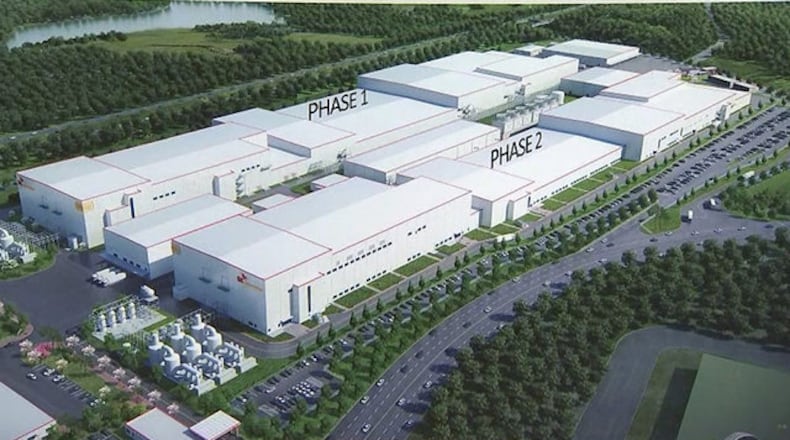Georgia’s biggest jobs deal in a decade came with one of the state’s biggest-ever incentive packages.
The state and Jackson County combined offered SK Innovation about $300 million in grants, tax breaks and free land to convince the company to build an electric car battery plant along I-85 in Commerce, according to an offer letter obtained Thursday by The Atlanta Journal-Constitution through an open records request.
Georgia’s offer includes sales tax exemptions for equipment and energy as well as research and development tax credits that could generate millions more in benefits to SK Innovation for years to come, letter shows.
SK Innovation held a ceremonial groundbreaking Tuesday for the nearly $1.7 billion factory, which the company said will employ 2,000 people and generate batteries to power 250,000 electric vehicles per year at full capacity in 2025. It will rise on nearly 300 acres about 65 miles northeast of downtown Atlanta.
The incentive deal is the largest in Georgia since the $1.2 billion Kia Motors factory opened in West Point in 2009. Kia was offered $410 million in subsidies and other perks from state and local officials, according to data from Good Jobs First, a left-leaning incentives watchdog group. The $300 million offered SK Innovation would rank second.
Incentives are a common and controversial currency in the job creation battle between job-hungry states. Elected leaders often contend incentives are part of the price of recruiting new jobs and investment.
Credit: Special to AJC
Credit: Special to AJC
Critics say state and local governments often pay dearly for jobs and corporate investments that would have happened anyway.
J.C. Bradbury, a Kennesaw State University economist, said the promised jobs and investment often don’t justify such heavy subsidies.
“That type of investment normally assures you a share of the profits. That’s generous,” Bradbury said of the SK Innovation package.
In an interview earlier this week, the company's CEO, Jun Kim, said Georgia's offer was similar to packages from other Sun Belt states that courted the company.
“But there were other factors than just tax benefits that were weighed quite heavily on our decisions,” Kim said, including workforce availability, the state’s business climate and perhaps most importantly, Georgia’s Quick Start customized training program.
“Since we’re not planning to do just business for one or two years in the easiest places and just exit, our plan is to find a place we could grow together with the community as a part of the community,” Kim said. “The selection of the location was more of a process of deciding who we wanted to work with.”
The bulk of the state incentives are tax credits or exemptions that require the company to hire and retain workers for certain periods of time, or make certain investments for the company to claim the tax break. The $18.75 million state grant also includes a claw back mechanism that allows Georgia to seek repayment if SK fails to meet at least 80 percent of its combined jobs and investment goal.
Georgia is no stranger to blockbuster incentives offerings. The state's unsuccessful pitch for Amazon's second headquarters featured more than $2 billion in incentives, including a state-funded training academy, an exclusive lounge and free parking at Atlanta's airport and an Amazon-dedicated car on MARTA.
Georgia started recruiting SK Innovation, which is part of South Korean conglomerate SK Group, near the end of former Gov. Nathan Deal's second term. In October, about six weeks before the project was formally announced, Georgia's top economic development recruiter delivered the state's secret offer.
“Georgia offers unique assets that give your business the advantage it needs to grow and compete,” Pat Wilson, the state’s commissioner of economic development, wrote the company in a letter dated Oct. 10. “Georgia’s outstanding logistics, well-trained and educated workforce, low business costs, pro-business climate and high quality of life have landed it on a number of “Best Of” lists.”
Included in the “Best Of’ lists was Georgia’s top ranking for business by industry publication Site Selection.
The five-page letter, which referenced the battery factory as “Project Hercules,” went on to detail tax breaks, grants and other perks SK qualified to receive.
The list includes:
- A state project development grant of $18.75 million.
- 283 acres of free land valued at $18.76 million.
- Mega Project Tax Credits for new jobs created valued at more than $53 million if the company meets its goals.
- Georgia Quick Start training to prepare new workers valued at nearly $7.4 million.
The letter values the state incentives at $176.8 million, not including potential ongoing incentives such as the R&D tax credit and tax exemptions for qualified machinery and software used in manufacturing, energy used in the manufacturing of batteries and for high-tech investments such as equipment for sensitive production areas known as “clean rooms.”
Jackson County offered $122.7 million in incentives, including 20 years of property tax breaks, according to the document.
The letter valued the incentives assuming SK would spend $1.6 billion on the factory and hire 2,032 people at an average wage of $40,000 per year within six years.
Many economists often tout the job-creating power of manufacturing because of the potential for spin-off growth from suppliers and other ancillary businesses.
But Bradbury said such incentive packages are unfair to other taxpayers who don’t receive the same sorts of subsidies and will shoulder a greater tax burden.
Gov. Brian Kemp said Tuesday landing SK “shows the commitment we have for remaining the No. 1 state in the country for business.”
“We’ll see how it plays out over the years,” he said following the groundbreaking ceremony. “But also, we have the great opportunity for other manufacturers and suppliers to the company to come with them, which would just create good opportunities further down the line for hardworking Georgians.”
About the Author
The Latest
Featured




